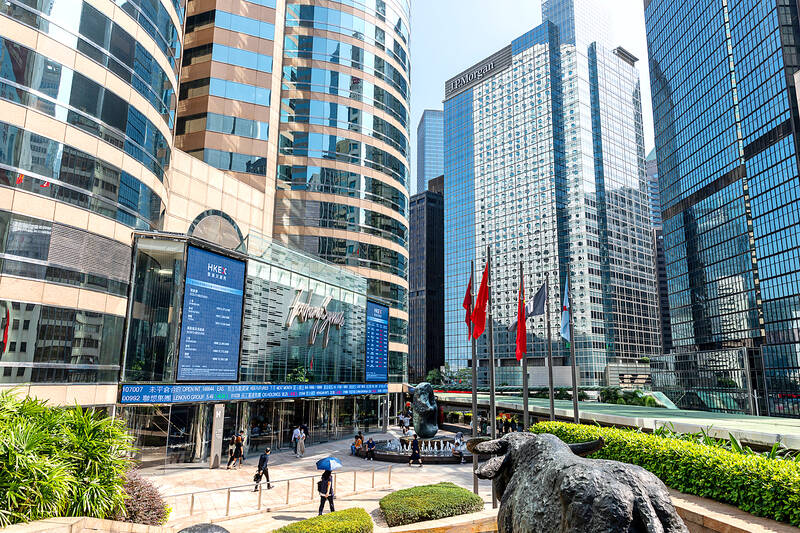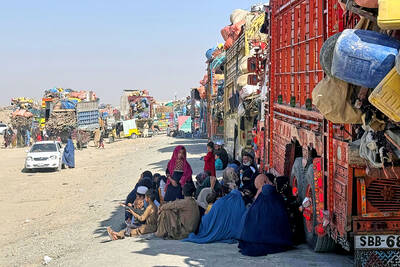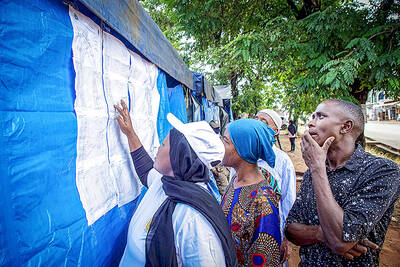Hong Kong is considering easing property taxes and visa restrictions as authorities seek to curb a pandemic brain drain that has threatened the territory’s status as an international financial hub.
Hong Kong Chief Executive John Lee (李家超) could include the measures in his maiden policy address later this month, according to people familiar with the matter, who asked not to be identified because the deliberations are private.
One of the moves under consideration is to make it easier for Hong Kong-based companies to hire non-local workers in 13 priority professions, including asset management, fintech and environmental, social and governance financial services, one of the people said.

Photo: EPA-EFE
Firms would no longer need to go through a lengthy process of showing they have made an effort to recruit locals for the roles before hiring from China or abroad, the person said.
The government could also relax rules on a 15 percent stamp duty that nonresident property buyers need to pay, with part or all of the impost likely to be refunded after workers have stayed in Hong Kong for a certain number of years, some of the people said. It remains unclear what the minimum period is and whether all nonresident buyers would qualify.
Hong Kong has been left reeling from almost four years of political turmoil and COVID-19 border closures that largely cut the territory off from the outside world. It has led to an exodus of residents, many from key industries such as financial services, has plunged the economy into a prolonged recession, and devastated the travel and retail industries.
Even the fabled property market is cracking, with home prices falling and unsold apartments piling up.
Although the territory has relaxed some of its harshest travel restrictions, including last month scrapping mandatory hotel quarantine on entry to Hong Kong, doubt remains whether it can reclaim its past glory due to the slow pace of easing and reluctance to reopen fully. A report last month said long-time rival Singapore had overtaken Hong Kong to become Asia’s top financial center.
The Hang Seng Properties Index yesterday pared an earlier decline of 2.1 percent to trade slightly higher in afternoon trade as shares of developers including New World Development Co and Sun Hung Kai Properties Ltd rallied on the news. New World rose as much as 4 percent and Sun Hung Kai gained 2.6 percent.
In other moves to reverse the trend and entice workers back to Hong Kong, officials are considering a new form of visa to make it easier for nonlocals to work in the territory, the people said, without divulging details.
Other measures being discussed include cash subsidies for some highly skilled professionals and setting up a specific government branch to attract and manage Chinese and overseas workers and investment, the people said. The details could still change and some of the measures might not make it to Lee’s speech next week, they said.
Exempting companies from having to prove their efforts to recruit local workers first before looking outside the territory for key professions would be one measure that would differentiate Hong Kong from Singapore, where firms are subject to a cap on foreign hires.
Singapore has been relaxing some of its rules, including introducing flexible five-year work visas for foreigners paid at least S$30,000 (US$20,900) a month to attract high earners, especially from Hong Kong. The new visa would allow holders to switch jobs and make it easier for their spouses to work.
Lee’s policy address would introduce “bold measures” to attract investment and skilled workers, Hong Kong Financial Secretary Paul Chan (陳茂波) said last week.
Chan cited multiple global headwinds as challenging the territory, including rising inflation and interest rates, and the war in Ukraine.

With much pomp and circumstance, Cairo is today to inaugurate the long-awaited Grand Egyptian Museum (GEM), widely presented as the crowning jewel on authorities’ efforts to overhaul the country’s vital tourism industry. With a panoramic view of the Giza pyramids plateau, the museum houses thousands of artifacts spanning more than 5,000 years of Egyptian antiquity at a whopping cost of more than US$1 billion. More than two decades in the making, the ultra-modern museum anticipates 5 million visitors annually, with never-before-seen relics on display. In the run-up to the grand opening, Egyptian media and official statements have hailed the “historic moment,” describing the

‘CHILD PORNOGRAPHY’: The doll on Shein’s Web site measure about 80cm in height, and it was holding a teddy bear in a photo published by a daily newspaper France’s anti-fraud unit on Saturday said it had reported Asian e-commerce giant Shein (希音) for selling what it described as “sex dolls with a childlike appearance.” The French Directorate General for Competition, Consumer Affairs and Fraud Control (DGCCRF) said in a statement that the “description and categorization” of the items on Shein’s Web site “make it difficult to doubt the child pornography nature of the content.” Shortly after the statement, Shein announced that the dolls in question had been withdrawn from its platform and that it had launched an internal inquiry. On its Web site, Le Parisien daily published a

‘NO WORKABLE SOLUTION’: An official said Pakistan engaged in the spirit of peace, but Kabul continued its ‘unabated support to terrorists opposed to Pakistan’ Pakistan yesterday said that negotiations for a lasting truce with Afghanistan had “failed to bring about a workable solution,” warning that it would take steps to protect its people. Pakistan and Afghanistan have been holding negotiations in Istanbul, Turkey, aimed at securing peace after the South Asian neighbors’ deadliest border clashes in years. The violence, which killed more than 70 people and wounded hundreds, erupted following explosions in Kabul on Oct. 9 that the Taliban authorities blamed on Pakistan. “Regrettably, the Afghan side gave no assurances, kept deviating from the core issue and resorted to blame game, deflection and ruses,” Pakistani Minister of

UNCERTAIN TOLLS: Images on social media showed small protests that escalated, with reports of police shooting live rounds as polling stations were targeted Tanzania yesterday was on lockdown with a communications blackout, a day after elections turned into violent chaos with unconfirmed reports of many dead. Tanzanian President Samia Suluhu Hassan had sought to solidify her position and silence criticism within her party in the virtually uncontested polls, with the main challengers either jailed or disqualified. In the run-up, rights groups condemned a “wave of terror” in the east African nation, which has seen a string of high-profile abductions that ramped up in the final days. A heavy security presence on Wednesday failed to deter hundreds protesting in economic hub Dar es Salaam and elsewhere, some